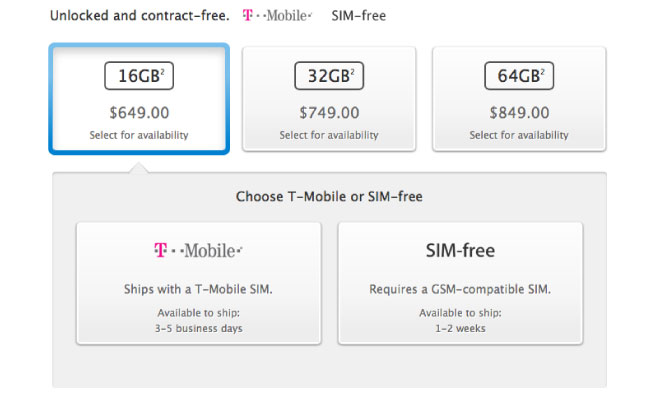The "big four" U.S. wireless providers, all of which offer Apple's iPhone and iPad, have reached an agreement on six standard principles by which consumers' mobile phones and tablets will be unlocked for use on competing carriers and overseas.
AT&T, Sprint, T-Mobile, and Verizon Wireless have all recommended that the six principles be included in the CTIA Consumer Code for Wireless Service. Once the rules are officially adopted by the governing agency, all of the carriers, as well as member U.S. Cellular, have pledged to "move quickly" to implement them.
The carriers have agreed to clearly disclose their unlocking policies on their respective websites, to unlock mobile devices for customers after their service contract has expired, and to unlock prepaid mobile devices no later than one year after their initial activation."We believe this agreement will continue to foster the world-leading range of devices and offerings that Americans enjoy today." - CTIA President & CEO Steve Largent
The carriers will also notify customers once their devices are eligible for unlocking, and will respond to unlock requests from customers within two business days. Finally, customers in good standing who become deployed military personnel and can provide necessary paperwork will have their devices unlocked by their carrier.
"We believe this agreement will continue to foster the world-leading range of devices and offerings that Americans enjoy today," CTIA President and CEO Steve Largent said in a statement. "The robust and differentiated technological ecosystem has brought unparalleled and world-leading benefits to American wireless users, in the form of high-end and affordable devices, post- and pre-paid options, and with the world's most advanced devices being launched first in the United States."
The full list of six principles adopted by major U.S. carriers is included below:
1. Disclosure. Each carrier will post on its website its clear, concise, and readily accessible policy on postpaid and prepaid mobile wireless device unlocking.2. Postpaid Unlocking Policy. Carriers, upon request, will unlock mobile wireless devices or provide the necessary information to unlock their devices for their customers and former customers in good standing and individual owners of eligible devices after the fulfillment of the applicable postpaid service contract, device financing plan or payment of an applicable early termination fee.
3. Prepaid Unlocking Policy. Carriers, upon request, will unlock prepaid mobile wireless devices no later than one year after initial activation, consistent with reasonable time, payment or usage requirements.
4. Notice. Carriers that lock devices will clearly notify customers that their devices are eligible for unlocking at the time when their devices are eligible for unlocking or automatically unlock devices remotely when devices are eligible for unlocking, without additional fee. Carriers reserve the right to charge non-customers/non-former customers a reasonable fee for unlocking requests. Notice to prepaid customers may occur at point of sale, at the time of eligibility, or through a clear and concise statement of the policy on the carrier's website.
5. Response Time. Within two business days after receiving a request, carriers will unlock eligible mobile wireless devices or initiate a request to the OEM to unlock the eligible device, or provide an explanation of why the device does not qualify for unlocking, or why the carrier reasonably needs additional time to process the request.
6. Deployed Personnel Unlocking Policy. Carriers will unlock mobile wireless devices for deployed military personnel who are customers in good standing upon provision of deployment papers.
 Neil Hughes
Neil Hughes







-m.jpg)






 Malcolm Owen
Malcolm Owen
 Amber Neely
Amber Neely


 Christine McKee
Christine McKee

 Chip Loder
Chip Loder
 Marko Zivkovic
Marko Zivkovic









19 Comments
Have not seen anything but unlocking, locking devices, how about data and stuff.
I read in these forums recently a statement that unlocking an iPhone disables CDMA, rendering a CDMA+GSM phone as a GSM-only phone. Anyone able to confirm this? It seems like a rather one-way path toward AT&T, if true. Or does having 4G-LTE overcome/circumvent this?
Have not seen anything but unlocking, locking devices, how about data and stuff.
What are you asking? Are you asking? (I don't see a question mark.)
I read in these forums recently a statement that unlocking an iPhone disables CDMA, rendering a CDMA+GSM phone as a GSM-only phone. Anyone able to confirm this? It seems like a rather one-way path toward AT&T, if true. Or does having 4G-LTE overcome/circumvent this?
Some one correct me if I am wrong but not all CDMA networks are the same, You can not take an unlock VZ CDMA phone and use it in Japan on their CDMA, there is no standards. Based on this unlocking a CDMA with GSM makes it a GSM only phone unless you plan to go back to the provider who unlock it in the first place.
[quote name="TeaEarleGreyHot" url="/t/161161/us-carriers-agree-to-standard-set-of-rules-for-unlocking-phones-tablets#post_2445950"]I read in these forums recently a statement that unlocking an iPhone disables CDMA, rendering a CDMA+GSM phone as a GSM-only phone. Anyone able to confirm this? It seems like a rather one-way path toward AT&T, if true. Or does having 4G-LTE overcome/circumvent this? [/quote] In the us we have GSM and CDMA networks. Carriers like AT&T and T-mobile use GSM and Verizon and Sprint use CDMA. Most countries in the world use GSM. The difference is with GSM the phone is identified and allowed network access with a removable SIM card. With CDMA carriers identify and grant network access through the phones unique identifer number. So with an unlocked GSM phone one merely has to put a useable SIM in the phone. With CDMA the carrier has to grant your unique phone access as opposed to merely activating a SIM. A particular phone might also not support all of the carriers various frequencies. It is probably easier to switch carriers in the US on GSM networks. You have T-Mobile, AT&T, straight talk, and AIO as some options.